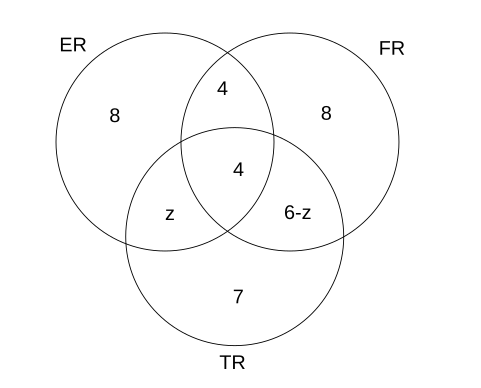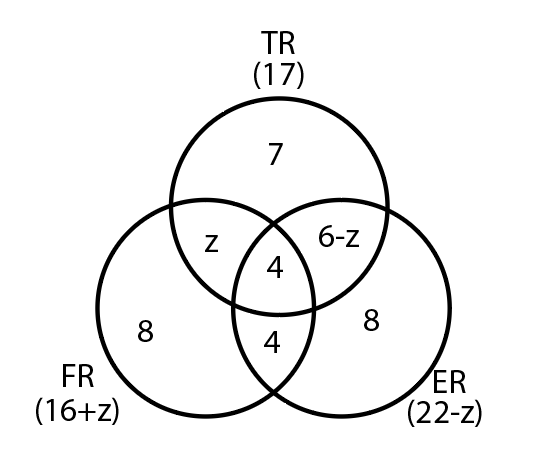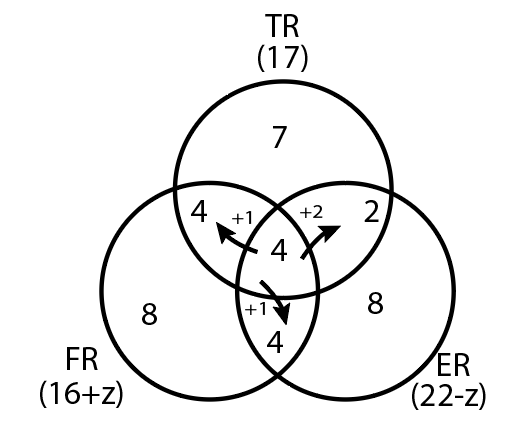CAT 2005 Question Paper
The year is 2089. Beijing, London, New York, and Paris are in contention to host the 2096 Olympics. The eventual winner is determined through several rounds of voting by members of the IOC with each member representing a different city. All the four cities in contention are also represented in IOC.

In any round of voting, the city receiving the lowest number of votes in that round gets eliminated. The survivor after the last round of voting gets to host the event.
A member is allowed to cast votes for at most two different cities in all rounds of voting combined. (Hence, a member becomes ineligible to cast a vote in a given round if both the cities (s)he voted for in earlier rounds are out of contention in that round of voting.)
A member is also ineligible to cast a vote in a round if the city (s)he represents is in contention in that round of voting.
As long as the member is eligible, (s)he must vote and vote for only one candidate city in any round of voting.The following incomplete table shows the information on cities that received the maximum and minimum votes in different rounds, the number of votes cast in their favour, and the total votes that were cast in those rounds.It is also known that:
All those who voted for London and Paris in round 1, continued to vote for the samecities in subsequent rounds as long as these cities were in contention. 75% of those whovoted for Beijing in round 1, voted for Beijing in round 2 as well.
Those who voted for New York in round 1, voted either for Beijing or Paris in round 2.
The difference in votes cast for the two contending cities in the last round was 1.
50% of those who voted for Beijing in round 1, voted for Paris in round 3.
CAT 2005 - Question 51
What percentage of members from among those who voted for Beijing in round 2 and were eligible to vote in round 3, voted for London?
CAT 2005 - Question 52
Which of the following statements must be true?
a. IOC member from New York must have voted for Paris in round 2.
b. IOC member from Beijing voted for London in round 3.
The table below presents the revenue (in million rupees) of four firms in three states. These firms, Honest Ltd., Aggressive Ltd., Truthful Ltd. and Profitable Ltd. are disguised in the table as A,B,C and D, in no particular order.

Further, it is known that:
In the state of MP, Truthful Ltd. has the highest market share.
Aggressive Ltd.’s aggregate revenue differs from Honest Ltd.’s by Rs. 5 million.
CAT 2005 - Question 53
What can be said regarding the following two statements?
Statement 1: Profitable Ltd. has the lowest share in MP market.
Statement 2: Honest Ltd.’s total revenue is more than Profitable Ltd.
CAT 2005 - Question 54
What can be said regarding the following two statements?
Statement 1: Aggressive Ltd.’s lowest revenues are from MP.
Statement 2: Honest Ltd.’s lowest revenues are from Bihar.
CAT 2005 - Question 55
What can be said regarding the following two statements?
Statement 1: Honest Ltd. has the highest share in the UP market.
Statement 2: Aggressive Ltd. has the highest share in the Bihar market.
CAT 2005 - Question 56
If Profitable Ltd.’s lowest revenue is from UP, then which of the following is true?
Help Distress (HD) is an NGO involved in providing assistance to people suffering from natural disasters. Currently, it has 37 volunteers. They are involved in three projects: Tsunami Relief (TR) in Tamil Nadu, Flood Relief (FR) in Maharashtra, and Earthquake Relief (ER) in Gujarat. Each volunteer working with Help Distress has to be involved in at least one relief work project.
- A Maximum number of volunteers are involved in the FR project. Among them, the number of volunteers involved in FR project alone is equal to the volunteers having additional involvement in the ER project.
- The number of volunteers involved in the ER project alone is double the number of volunteers involved in all the three projects.
- 17 volunteers are involved in the TR project.
The number of volunteers involved in the TR project alone is one less than the number ofvolunteers involved in ER project alone.
Ten volunteers involved in the TR project are also involved in at least one more project.
CAT 2005 - Question 57
Based on the information given above, the minimum number of volunteers involved in both FR and TR projects, but not in the ER project is:
CAT 2005 - Question 58
Which of the following additional information would enable to find the exact number of volunteers involved in various projects?
CAT 2005 - Question 59
After some time, the volunteers who were involved in all the three projects were asked to withdraw from one project. As a result, one of the volunteers opted out of the TR project, and one opted out of the ER project, while the remaining ones involved in all the three projects opted out of the FR project. Which of the following statements, then, necessarily follows?
CAT 2005 - Question 60
After the withdrawal of volunteers, as indicated in the previous question, some new volunteers joined the NGO. Each one of them was allotted only one project in a manner such that, the number of volunteers working in one project alone for each of the three projects became identical. At that point, it was also found that the number of volunteers involved in FR and ER projects was the same as the number of volunteers involved in TR and ER projects. Which of the projects now has the highest number of volunteers?











